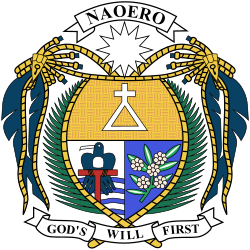 |
|---|
Parliamentary elections were held in Nauru on 9 December 1989, after the resignation of President Hammer DeRoburt following a vote of no-confidence in August and the subsequent resignation of his replacement, Kenas Aroi, for health reasons. [1] Following the election Bernard Dowiyogo was elected President by the Parliament, defeating DeRoburt. [1] Voter turnout was 88.7%. [2]